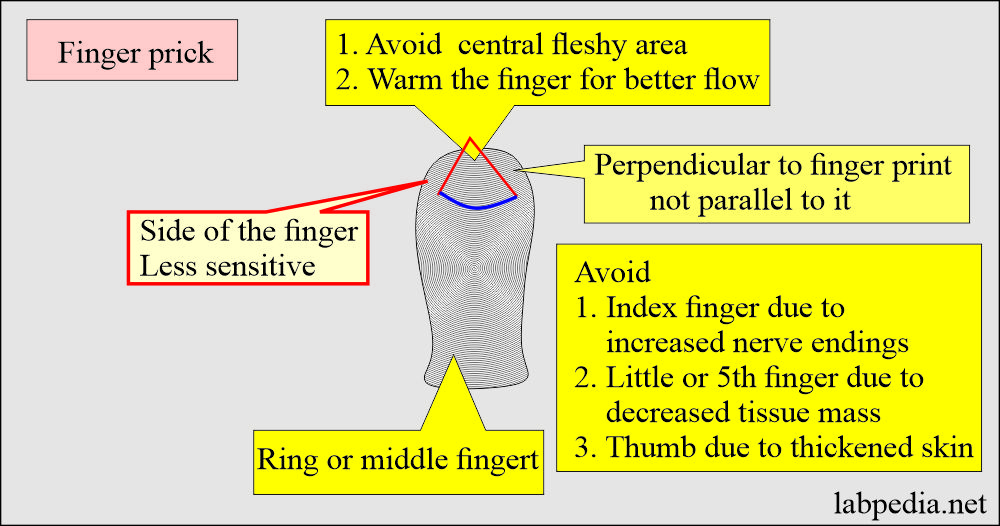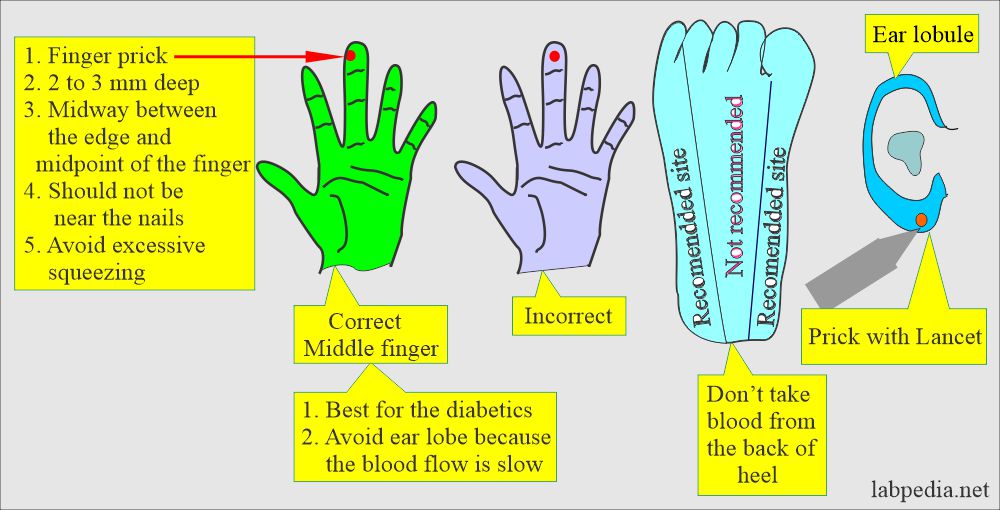Diabetes Mellitus, How to Take Blood Sample?
How to Take Blood Sample?
- Diabetes mellitus can be controlled by diet, exercise, and drugs, which depend upon the fasting glucose level.
How will you control Diabetes mellitus based on fasting blood glucose levels?
| Fasting blood glucose level | Type of Diabetes Mellitus | Recommendations to control the glucose level |
|
|
|
|
|
|
|
|
|
|
|
|
What are the American Diabetes Association recommendations for diabetics?
- Fasting blood glucose = 80 to 120 mg/dL (before eating).
- After eating the food = <180 mg/dL.
- At bedtime = 100 to 140 mg/dL.
When you need consultation, what are your blood glucose levels?
- Before meal = >140 mg/dL.
- Bed time = >160 mg/dL
What are the recommendations for testing the blood glucose level?
- In diabetes mellitus type 1 = 4 times /day (before the meal and at bedtime).
- Diabetes mellitus type 2 without insulin and drugs = 2 times/day, fasting and before dinner.
- Diabetes mellitus type 2 with insulin = 4 times/day (before meal and bedtime).
- Diabetes mellitus type 2 taking medications = 3 times/day (Fasting, before dinner, and at bedtime).
| Type of diabetes mellitus | Treatment level | Glucose to be checked | Fasting level | Before dinner | At bedtime |
| Diabetes mellitus type 1 | On Insulin | 4 times/day | Yes | Yes | Yes |
| Diabetes mellitus type 2 | No drugs | 2 times/day | Yes | Yes | No |
| Diabetes mellitus type 2 | On insulin | 4 times/day | Yes | Yes | Yes |
| Diabetes mellitus type 2 | On drugs | 3 times/day | Yes | Yes | Yes |
What are the precautions for taking the blood sample?
- It is better to wash your hands before testing the blood glucose.
- Also, dry the finger thoroughly to avoid contamination by the water vapors.
- I will recommend the lancet, especially the “one-touch Delica Plus.” This technology uses fine needles, and the procedure is mostly painless.
- You can use different sites like the ear lobe, forearm, and fingertip.
- Avoid touching the strip with your finger, which may contaminate the strip.
- Follow the meter instructions before testing the blood glucose level.
How will you take the blood sample?
- The fingertip is easier and more practical for getting one drop of blood.
How will you convert mg/dL to mmol/L?
- mg/dL/18 (your value in mg/dL is divided by 18).
- Fasting level: 80 to 120 mg/dL = 4.4 to 6.6 mmol/L
- After food = <180 mg/dL = <10 mmol/L.
- At bedtime = 100 to 140 mg/dL = 5.5 to 7.7 mmol/L


